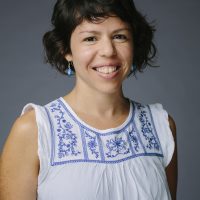Sofia Fortunato
Postdoctoral Research Fellow
PhD, University of Bergen, Norway (2014)
Program 3: Responding to a Changing World.
Coral genomics group.
James Cook University
sofia.valerofortunato@jcu.edu.au

From 2005 to 2022, the main node of the ARC Centre of Excellence for Coral Reef Studies was headquartered at James Cook University in Townsville, Queensland (Australia)








Postdoctoral Research Fellow
PhD, University of Bergen, Norway (2014)
Program 3: Responding to a Changing World.
Coral genomics group.
James Cook University
sofia.valerofortunato@jcu.edu.au
Sofia Fortunato obtained a MSc. in Microbiology and a PhD in Evolutionary Developmental Biology at the University of Bergen and the Sars centre for Marine Molecular Biology, in Norway. During her PhD she used genomics to understand the evolution of developmental genes in sponges. Sofia likes using an integrating approach in ecology, evolution, developmental biology and genetics to understand molecular mechanisms of calcification and stress responses in cnidarians and sponges associated to corals reefs by using genomics and other molecular techniques. She is involved in the genome and transcriptome project of several calcareous sponges. She is also a visual artists who likes using microscopic techniques, painting and illustrations to communicate sciences.
Projects and Collaborations:
Genome project of calcareous sponges, including the sponge Pericharax sp of the Great Barrier Reef together with collaborators Maja Adamska, Marcin Adamski (Australia National University, ANU, Canberra) and with Oliver Voigt (LMU, Germany). This project will allow her to understand the evolution of the calcifying machinery in calcisponges.
Developmental biology and molecular mechanisms of calcification in corals (with Aurelie Moya and David Miller, coral genomics group).
Publications
SAV Fortunato, M Vervoort, M Adamski, M Adamska (2016). Conservation and divergence of bHLH genes in the calcisponge Sycon ciliatum EvoDevo 7 (1), 23.
S Jensen, SAV Fortunato, F Hoffmann, S Hoem, HT Rapp, L Øvreås et al. (2016). The Relative Abundance and Transcriptional Activity of Marine Sponge-Associated Microorganisms Emphasizing Groups Involved in Sulfur Cycle. Microbial Ecology, 1-9
SAV Fortunato, M Adamski, M Adamska (2015). Comparative analyses of developmental transcription factor repertoires in sponges reveal unexpected complexity of the earliest animals. Marine Genomics 24, 121-129.
SAV Fortunato, M Adamski, OM Ramos, S Leininger, J Liu, DEK Ferrier, M Adamska (2014). Calcisponges have a ParaHox gene and dynamic expression of dispersed NK homeobox genes.Nature 514 (7524), 620-623
Sven Leininger, Marcin Adamski, Brith Bergum, Corina Guder, Jing Liu, Mary Laplante, Jon Bråte, Friederike Hoffmann, Sofia Fortunato, Signe Jordal, Hans Tore Rapp, Maja Adamska. (2014). Developmental gene expression provides clues to relationships between sponge and eumetazoan body plans. Nat Comm. 5
SAV Fortunato, S Leininger, M Adamska (2014). Evolution of the Pax-Six-Eya-Dach network: the calcisponge case study. EvoDevo 5 (1), 1.
S Fortunato, M Adamski, B Bergum, C Guder, S Jordal, S Leininger et al. (2012). Genome-wide analysis of the sox family in the calcareous sponge Sycon ciliatum: multiple genes with unique expression patterns. EvoDevo 3 (1), 1.
New DNA techniques are being used to understand how coral reacted to the end of the last ice age in order to better predict how they will cope with current changes to the climate. James Cook Univer
A new study on the effects of climate change in five tropical countries has found fisheries are in more trouble than agriculture, and poor people are in the most danger. Distinguished Profess
James Cook University researchers have found brightly coloured fish are becoming increasingly rare as coral declines, with the phenomenon likely to get worse in the future. Christopher Hemingson, a
Researchers working with stakeholders in the Great Barrier Reef region have come up with ideas on how groups responsible for looking after the reef can operate more effectively when the next bleaching
Abstract: As marine species adapt to climate change, their heat tolerance will likely be under strong selection. Individual variation in heat tolerance and its heritability underpin the potential fo
Abstract: The Reef Ecology Lab in KAUST’s Red Sea Research Center explores many aspects of movement ecology of marine organisms, ranging from adult migrations to intergenerational larval dispersal
Abstract: Macroalgal meadows are a prominent, yet often maligned component of the tropical seascape. Our work at Ningaloo reef in WA demonstrate that canopy forming macroalgae provide habitat for ad
Abstract: Sharks are generally perceived as strong and fearsome animals. With fossils dating back at least 420 million years, sharks are not only majestic top predators but they also outlived dinosa
Abstract: Connectivity plays a vital role in many ecosystems through its effects on fundamental ecological and evolutionary processes. Its consequences for populations and metapopulations have been
Abstract: Evolution of many eukaryotic organisms is affected by interactions with microbes. Microbial symbioses can ultimately reflect host’s diet, habitat range, and even body shape. However, how
Abstract: The past few years have seen unprecedented coral bleaching and mortality on the Great Barrier Reef (GBR) but the consequences of this on biodiversity are not yet known. This talk will expl